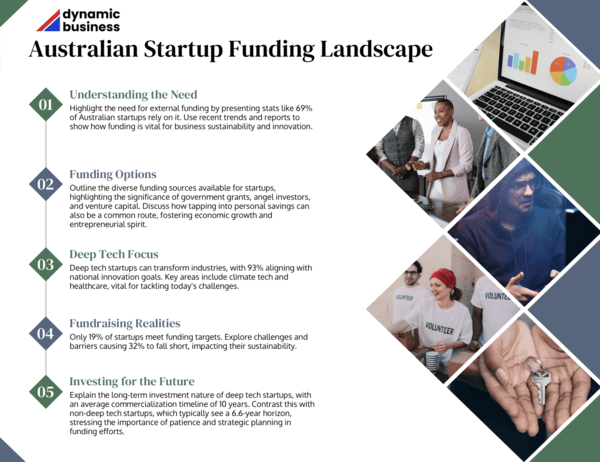The 2024 Startup Muster report, Australia’s largest survey of startups, highlights the progress, challenges, and opportunities in the startup ecosystem, with a special focus on the deep tech sector in collaboration with Main Sequence.
Australia’s startup ecosystem is rapidly evolving, driven by a blend of ambition, cutting-edge technology, and a growing sense of purpose. It’s a landscape where innovation thrives and where entrepreneurs are increasingly looking to tackle some of the world’s most pressing challenges.
In this report, we explore the dynamic nature of this ecosystem, diving into the vital areas of funding, the funding journey, and the impact of deep tech startups that are shaping the future.

Funding Landscape: Where the Money Comes From
A major finding of the report is the heavy reliance on external funding by Australian startups, with 69% of them depending on outside capital to fuel their operations. This need for external financial support highlights the central role of investors, government-backed initiatives, and other funding streams in driving startup success. While government grants are a key source, ranging between 28-38%, there is still significant reliance on angel funding (13-30%), venture capital (19-30%), and personal savings (33-38%) to cover the gap.
The varying nature of these funding sources reflects the diverse landscape within which startups operate. Government funding plays a crucial stabilizing role, but the volatility and unpredictability of the venture capital space demonstrate the challenges startups face in securing the financial backing needed to grow and scale. A significant trend emerging in Australia’s startup scene is the rise of deep tech startups, which focus on transformative technologies like AI, biotechnology, quantum computing, and advanced materials. These ventures are not just looking to innovate for the sake of innovation—they are strategically aligned with national priorities. An astounding 93% of deep tech startups are in line with the goals of the National Reconstruction Fund, a sharp contrast to just 56% of non-deep tech startups.
This alignment speaks volumes about deep tech’s potential to reshape Australia’s economy. From tackling climate change and healthcare challenges to advancing clean energy, deep tech startups are at the forefront of solving some of the most pressing global issues. These startups are not just driving innovation—they are laying the groundwork for a more sustainable and economically resilient future for the nation.
The fundraising journey: Realities and challenges
While some startups manage to secure the funding they need, the journey is fraught with challenges. According to the report, 19% of startups successfully raised their target capital, but a significant 32% fell short of their funding goals. This highlights the gaps in Australia’s investment landscape, suggesting a need for a more supportive and accessible environment for startups at all stages of development.
Deep tech startups face particularly difficult fundraising realities. These companies typically require patient capital due to their long-term commercialization horizons—often averaging 10 years, compared to the 6.6-year horizon for non-deep tech startups. This extended timeline underscores the need for investors who are willing to play the long game and provide the kind of support that ensures deep tech ventures can grow and thrive. Government programs play an indispensable role in supporting the startup ecosystem, particularly through initiatives like the R&D Tax Incentive. However, the report suggests there is room for improvement in how these programs operate. To further foster growth, the government could focus on:
- Streamlining Application Processes: Simplifying the paperwork and approval procedures could make these programs more accessible, especially for early-stage startups.
- Better Tailored Support for Early-Stage Ventures: More specific support for pre-revenue startups would provide crucial backing at a stage when it is most needed.
- Broaden Eligibility to Include Emerging Technologies: Expanding criteria to better include fields like software development and other emerging tech would ensure that startups in these growing industries don’t miss out on government support.
The potential of deep tech startups goes beyond just innovation—they are poised to be the drivers of economic transformation. With their focus on solving global challenges, deep tech ventures are positioned to become Australia’s economic powerhouse, creating sustainable growth and reshaping industries. However, realizing this potential requires a robust support system that nurtures collaboration, provides easy access to capital, and fosters long-term strategic investment.
The Australian government and private investors must work together to create an ecosystem where deep tech can flourish. By doing so, Australia will be in an ideal position to become a global leader in these high-impact industries, leading the charge on a global stage.
This article offers a snapshot of the core findings from the report, providing an overview of funding sources, the realities of fundraising, the rise of deep tech, and the importance of government backing. For a more detailed analysis, the full report delves into industry trends, regional variations, and a deeper look at how funding and innovation are shaping the future of Australia’s startup landscape.
Australia’s startup ecosystem is buzzing with ambition and innovation, but in 2024, securing the right funding remains a critical challenge. Funding | Investment, News Dynamic Business





